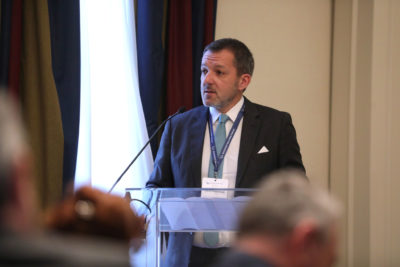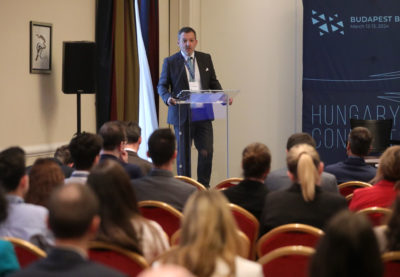Despotovski at the Balkan Forum in Budapest: let’s pay our people more to stay at home, not import foreigners
“Dealing with the labor shortage in the Western Balkans requires a rational and courageous approach. We should first see what can be done in the region with existing resources, and not go looking for manpower. We need a restructuring of the economy, investment in technology and industries that bring greater added value and better paid jobs,” said Jovan Despotovski, director of TIDZ at the Balkan Forum held in Budapest. Despotovski, at the invitation of the Hungarian Institute of Foreign Affairs, as the main speaker of the panel dedicated to dealing with the lack of labor in Central and South-Eastern Europe, emphasized that in order to solve this current issue, it is very important to see and analyze things through a quantitative and structural approach. approach to find effective solutions.
“The productivity gap between countries in the region, as evidenced by both productivity statistics and share of GDP per capita, raises critical questions about labor force efficiency and sectoral distribution. A comparison of Slovenia’s productivity with Macedonia, Serbia and Albania reveals sharp contrasts. Despite similar population sizes, Slovenia exhibits significantly higher levels of productivity. Here the question arises why the same number of people in Slovenia produce 5 times more than in Macedonia or why the same production in Serbia is generated with 3.5 times more people than in Slovenia?, Despotovski said. According to him, with the optimization of sectors and the transfer of workers, the necessary change can occur, for example with the transfer of workers from agriculture, traditional low-paid production activities, as well as from the public administration to sectors needed in the labor market.

In dealing with the labor shortage, foreign workers appear as a quick solution to alleviate the current pressures, Despotovski believes, but according to him, it is crucial to take into account cultural compatibility, language proficiency and adaptability when hiring foreign labor. along with technical skills.
“The concept of free movement of labor in Macedonia, Serbia and Albania within the framework of the Open Balkans has good potential to stimulate labor markets and stimulate economic growth. By allowing greater synergy between these countries, we can accelerate their common development line and close the gap we have with the more advanced economies. By encouraging the redefinition of sectors, reasonable acceptance of foreign labor and use of regional cooperation, we can pave the way for sustainable economic growth and prosperity throughout the Western Balkans,” Despotovski pointed out.
Representatives of the German Business Association for Southeast Europe, the Vienna Institute for Economic Studies, as well as professors from the Faculty of Economics in Belgrade and the Hungarian Foundation for Economic Research participated in the panel.
Over 100 experts, politicians and representatives of non-governmental organizations are participating in the Balkan Forum in Budapest 2024, organized by the Hungarian Institute for Foreign Affairs. Among them this year are the Minister of Foreign Affairs of Hungary, Peter Szijjártó, Dubravka Jedović, Minister of Mining and Energy of Serbia, Vesela Cherneva, Deputy Director of the European Council for Foreign Relations, and Igli Hassani, Minister of Europe and Foreign Affairs of Albania. The two-day forum this year focuses on energy, economy and the European integration of the Western Balkans. The Balkan Forum is being held for the eighth year in a row.

